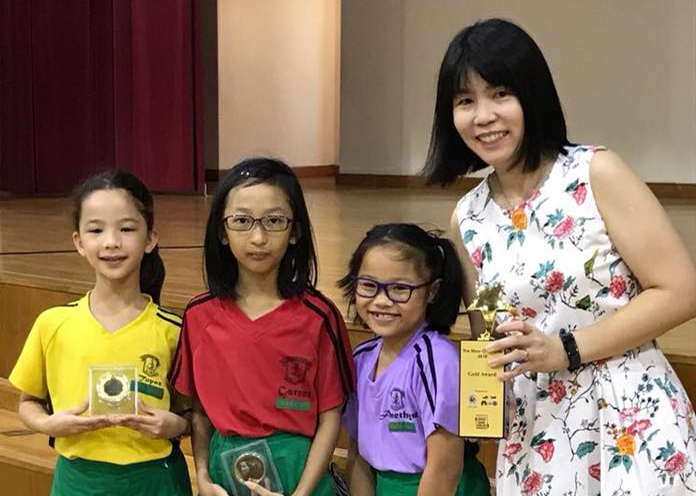Former marketer Mohamed Zubir Osman unpacks the art of the sell in the classroom

Five years into his sales and marketing job, Mr Mohamed Zubir Osman was doing well – the money was good, he enjoyed his work, and he felt a sense of achievement. At that point, he was also about to become a father for the first time. But it was right then that he decided to switch careers to become a teacher. “I realised something was missing,” he remembers.
As a secondary school student, he had fallen in love with History thanks to his teacher’s engaging style of teaching this subject. That same teacher’s motto of “connection before correction” also inspired him. “That means getting the teacher-student relationship right is paramount,” he explains. That was when Mr Zubir first thought about becoming a teacher. He ultimately decided to try out the private sector first. By the late 2000s though, he realised that his earlier dream was still alive.
“I wanted to make a direct impact on students, and build that connection with them,” he says. He also felt that his experience in sales and marketing would be helpful in teaching. “I had learnt a lot of problem-solving, communication, and leadership skills, which I thought would be transferable to the classroom setting.” With the support of his wife, he decided to take the plunge.

Following his year of training at the National Institute of Education (NIE), he was posted to Jurongville Secondary School, where he spent a decade teaching English, History, and Social Studies. Then came a stint in MOE Headquarters’ Psychological Services Branch, where he learnt more about supporting students with Special Education Needs. After which, he went to Woodgrove Primary School as the school’s Subject Head for Student Management.
His skills in building rapport with colleagues and clients from all walks of life have come in handy in the classroom. “Different students have different backgrounds,” he points out. “When you understand their needs, you can customise the way you teach them.”
Back when he was teaching in Jurongville Secondary, he would share stories from his previous job to help students who took Elements of Business Skills as a subject understand how marketing and sales work in the real world. “I told them to remember that a good product sells itself. But marketing is still important, because people also buy something when they like the service they receive – and that is about how you talk to people. I could then link that to the importance of communication, which is one of the emerging 21st century competencies.”
Such sharing can also give students a better understanding of how education can open different paths and help them realise their dreams. “I show them photos from my overseas travels, and I tell them, I never dreamed of going to these places, but through education, that’s what I was able to do,” says Mr Zubir. “I think such authentic real-life stories can be very powerful.”
Once a broadcaster, Eng Jie Ling now uses her journalism skills to make Chinese lessons sing

Back when she was working as a journalist for local Chinese language radio, Ms Eng Jie Ling often found herself patiently helping interviewees who did not feel confident about speaking in Mandarin. Some told her that she was good at honing their fluency and should consider becoming a Chinese language teacher.
In 2019, after four and a half years of journalism work, Ms Eng did indeed become a Chinese language teacher.
Her desire to teach goes way back. As a student, she took on tutoring and part-time teaching stints. After graduating from Nanyang Technological University, where she majored in Chinese Studies, she had applied for both a teaching position and a journalism job. The latter had a speedier selection process, which meant she had already started working as a reporter when she received an offer from MOE.
But the idea of teaching never lost its draw, and Ms Eng decided to make the switch when pursuing a different sense of purpose and a work life with less erratic hours became more appealing. Today, she teaches Chinese at her alma mater, Riverside Secondary School.

When she introduces herself to a new class, she always mentions that she used to be a journalist. That often piques her students’ interest and has even inspired at least one student to consider a journalism career, she shares. When a topic Ms Eng teaches happens to be one she previously reported on, she also integrates her old newsclips into her teaching materials. “That makes them pay more attention,” she says with a laugh.
Her previous skills are also very transferable. “As a reporter, I needed to communicate with a diverse group of audience and interviewees. This ability is essential in the classroom, because students come from different backgrounds,” she says. “Breaking down complex concepts into simpler and more engaging terms is another transferable skill. I also needed to practise active listening as a reporter, and that’s also important in the classroom to make sure my students feel supported.”
What drives her the most is helping to nurture a younger generation who loves the Chinese language. “When I get notes from students thanking me for making Chinese more interesting, or saying they want to continue taking this subject in the future, it gives me a sense of purpose,” she shares. “Chinese is not just an exam subject. I hope I can help students understand that it is a living language that they have to learn to speak in order to appreciate its beauty.”
From engineering trains, Peck Cheng Wee has moved to shaping lives

One of the big projects Mr Peck Cheng Wee worked on during his six years as an engineer involved modifying the electrical components of the trains used for the Downtown Line. Rail engineering work typically follows a graveyard shift schedule, as tasks can only commence once the trains have been secured in the depots.
Hoping to strike a better work-life balance so he could be more present for his two young children, he found himself drawn to the stories his wife told him about her life as a teacher. Soon, he decided to become a teacher himself. That was 10 years ago. Today, Mr Peck is the Level Head of Science at Compassvale Primary School.
What makes his work life satisfying now are his students. To engage them, Mr Peck tries to draw links between the concepts they learn, and applications in everyday life. For example, in the classrooms, fans are powered by electric motors which convert electrical energy into kinetic energy. Similarly, trains are also powered and propelled forward by electric motors.
Beyond supporting his students’ learning, he also loves helping them develop as people. “In my previous job, I could just follow a checklist. Now, I need to communicate with children, and you can’t really follow a checklist because children have emotions, they have different backgrounds, they have good days and bad days,” he reflects. “I find the nature of this work more meaningful, and it is something I enjoy a lot.”

While the workload is not lighter than engineering, there are clearer boundaries for his personal time. As a result, Mr Peck says he has been able to be around for his children more. In fact, learning to become an engaging teacher has also helped him in his parenting.
“In class, we need to inject fun into our lessons and find interesting ways to pique students’ curiosity for learning. I continue to hone my skills in that area, and I also apply what I learn in school to my own kids,” he says. “Previously, I was a boring parent, always asking, ‘Have you completed your homework?’ Now I’m trying different ways to connect with them. So, I learn from the students as much as I teach them.”






